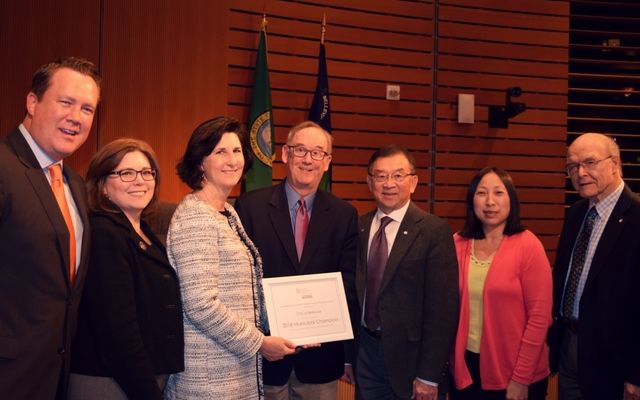Published March 21 2018

At Monday’s study session, the City Council reviewed plans for a new pilot permitting system to regulate private bike share companies that want to operate in Bellevue. Under the proposal, companies would need to apply for a right of way use permit to do business in the city. Brightly-colored bicycles from bike share vendors operating in Seattle already are showing up in Bellevue, but there is no current framework in place to regulate them.
Applications for the new permits could be accepted as early as April, with the system launch coming as soon as May. The proposed permit system attempts to balance the regulations needed to protect public spaces, with the flexibility that bike share vendors need to operate. Five city departments – Transportation, City Attorney’s Office, Police, Development Services, and Parks & Community Services – worked on the draft framework for the right of way permits. The proposed system is unique to Bellevue in its combination of key features, including:
-
Limiting permits to electric-assisted bicycles only;
-
Limiting the system at launch to 400 bicycles total, citywide, for all vendors;
-
Using a “dockless” system that does not require specific parking places, but instead designates preferred parking areas, or bike hubs;
-
Allowing for citywide bike share operation but targeting distribution to activity centers and transit; and
-
Requiring nightly “rebalancing” so that a large percentage of the fleet, on average, are in activity centers, and a majority are also at or near bike hubs.
The pilot permitting system aims to address concerns expressed by councilmembers, Transportation Commission members and other stakeholders. These issues include liability in case of a lawsuit involving a bike share bicycle, making sure operators are responsible for bikes on private property, and how to ensure riders comply with King County and Bellevue’s bicycle helmet laws.
The use of city funds to own or operate the bike share system is not being considered; the city’s primary roles would be regulation, oversight and enforcement. Costs incurred for bike hub installation, data collection and staff time to monitor compliance will be recovered through fees on permitted operators.
Public outreach for the bike share proposal began in September 2017 and has included an Eastside Bike Vendor Fair, an online survey that generated 816 responses, four briefings to the Transportation Commission, meetings with business organizations, and input from Bellevue employers, interest groups and individuals.
An evaluation of the pilot permit system will begin when the system launches and run through the end of December 2018. However pilot permits will be valid for up to one year from the system launch date. The Transportation Commission will get a progress report in September and a full evaluation of the system in early 2019. At that time, the system will be modified, if needed, to ensure it is operating safely and efficiently.
More information about the bike share pilot permit, along with communications from stakeholders, is available with the council agenda materials.
Livable City Year program
Also at the study session, the council was briefed on the city’s upcoming participation in the University of Washington’s Livable City Year program for 2018-19. The program connects city staff with students and faculty who will collaborate on projects to advance the council’s Vision Priorities, specifically around livability and sustainability. Councilmembers voiced enthusiastic support for Bellevue’s involvement.
More information on the program can be found in an earlier new release.
Affordable Housing Award
Later, the councilmembers took a moment to mention Bellevue’s latest honor: the Housing Development Consortium’s 2018 Municipal Champion Award. The award recognizes Bellevue’s financial commitment to A Regional Coalition for Housing (ARCH), which will help produce 400 affordable units in the region.
Addressing affordable housing has been an ongoing priority for the council. A formal strategy was adopted by the city last year. It includes 21 proposed actions aimed at improving affordable housing opportunities across Bellevue.
Supported Employment Program
During the regular session, the council was given an overview of the city’s Supported Employment Program. A direct result of the Diversity Advantage initiative and in partnership with the Human Resources Department, the program seeks to employ individuals living with disabilities in customized roles that highlight important skillsets such as data entry, document scanning, filing and greeting customers. Currently, the city has eight supported employees in six departments.
The presentation included an emotional statement from one supported employee, Jesse Gillman, and his family. Immediately following, councilmembers stressed the value of the program, praised staff for their hard work and reemphasized the need for a diverse workforce.
More information on the program is available in the council agenda memo. The full briefing is also available to watch via Bellevue Television streaming.
NOTE: On Monday, March 26, the City Council will hold a budget workshop at the Bellevue Public Safety Training Center (1838 116th Ave. NE) from 6 to 10 p.m. The workshop will focus on the upcoming 2019-20 budget process.
